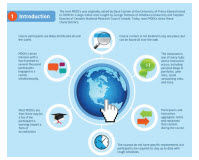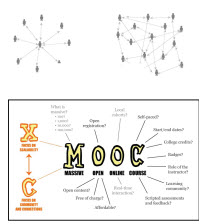A massive open online course (MOOC) is an online course aimed at large-scale interactive participation and open access via web. In addition to the traditional learning materials such as videos, audio and presentations, MOOCs provide interactive user forums that help build a community for the students, professors, and Teaching Assistants (TAs). MOOCs are a recent development in distance education.
Types of MOOC

In xMOOC model, concise targeted video content – short video clips are hosted rather than full-length lectures, and automated tests are administered to check students understanding as they work through the content. These MOOCs support discussion forums, and allow people to bounce ideas around and discuss learning together, but the center of the course is instructor-guided. Each students journey/trajectory through the course is linear and based on the absorption and understanding of fixed competencies. Learning is seen as something that can be tested and certified.

In cMOOCs, participants set their own learning goals and the type of engagement. They won't necessarily walk away with a fixed and tested set of competencies of a set body of contents. This makes cMOOCs tricky to grade, assess or certify. cMOOC environment the participants in the course act as both teachers and students, sharing information and engaging in a joint teaching and learning experience through intense interaction facilitated by technology like discussion forums, blogs, social networking sites (Facebook, Twitter), peer-reviews & group collaboration. These MOOCs enable the students to create their own Personal Learning Environments (PLEs) independently, and at the same time supports an interconnected knowledge.

Staffing agencies and large corporate are also exploring how MOOCs can be used to support workplace readiness and workforce development. Businesses are testing out ways to use MOOCs to engage their customers and build professional skills within their industries.
Advantages of the MOOC Model
• Online experience is constantly improving as technology continues to evolve
• Not constrained by time or geography
• Learning happens in an informal manner at the participant's own pace.
• Informal & Collaborative learning.
• By design, participants learn from one another, not from just the facilitators.
• Enrollment is open to anyone, anywhere; no fee, no credentials needed.
• Participants expand their learning environment and personal learning network.
• Peer assessment, Peer grading and Peer support.
• Assessment for content acquisition not a priority; participant defines his or her own success.
• The community or communities created often last beyond the course.
Challenges of the MOOC Model
• Digital literacy a pre-requisite.
• Amount of content can result in information overload.
• Course is "organic", so the direction it will take is not known.
• The course may or may not have facilitators - sometimes it is difficult to know whom to turn to for directions.
• Self regulation and motivation is a must • Dropout rates are high.
About the Author
Selva Muthu Kumar is the Creative Director / Partner at S3 Creative Boutique